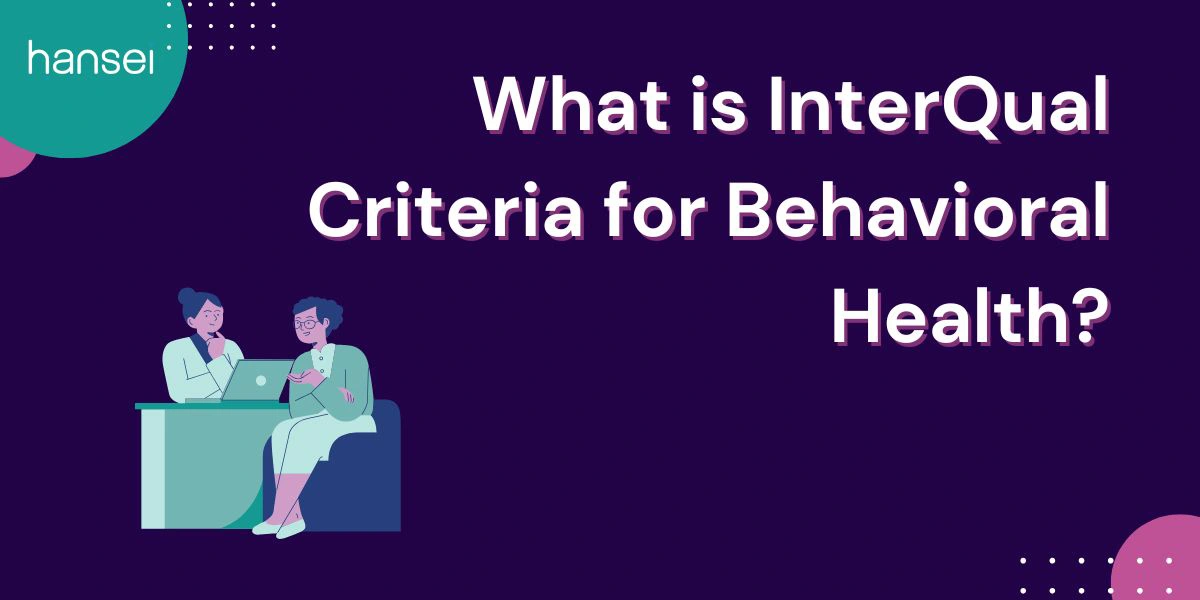Blog

Behavioral health care can be hard to navigate, especially when trying to determine the right level of care—ranging from inpatient hospitalization, outpatient therapy, or a specialized program. At Hansei Solutions, we understand the challenges behavioral healthcare providers face when making these decisions while balancing regulatory compliance and cost efficiency. This is where InterQual Criteria for Behavioral Health comes into play.
What Exactly Are InterQual Behavioral Health Criteria?
Imagine being a clinician tasked with deciding the best course of action for a patient battling severe anxiety or depression. Should they be hospitalized for intensive care, or would an outpatient program be more appropriate? InterQual Criteria provides a structured, evidence-based framework to help answer these questions. Developed by a team of over 1,100 independent experts—including psychiatrists, psychologists, and other specialists—these guidelines ensure patients receive the right care at the right time.
Why Are These Criteria So Important?
InterQual Criteria play a crucial role in addressing a significant issue in behavioral health care: access to treatment. In the U.S., only 41% of individuals who meet the criteria for certain behavioral health disorders receive any form of treatment. That leaves nearly 60% without the support they need, contributing to ongoing mental health challenges and increased healthcare costs.
By offering standardized guidelines, InterQual Criteria help close this gap, ensuring consistent and effective care decisions. This means patients are more likely to receive timely, appropriate interventions that improve their overall health outcomes. For more insights into behavioral health care challenges.
How Are the Criteria Developed?
InterQual Criteria are built on a solid foundation of evidence-based research. A multidisciplinary team of clinical experts conducts systematic reviews of medical literature, critically assessing studies to ensure the guidelines reflect the latest and most reliable evidence. These criteria are then peer-reviewed by independent specialists, guaranteeing they align with current best practices in behavioral health. This rigorous process makes InterQual Criteria a trusted resource for both clinicians and payers, ensuring that care decisions are both effective and cost-efficient.

Key Components Assessed by InterQual
When clinicians use InterQual Behavioral Health Criteria, they look at several critical areas to determine the most appropriate level of care:
- Risk of Harm: Evaluating whether the patient poses a danger to themselves or others, which influences the need for more intensive supervision.
- Functional Status: Assessing how the mental health issue impacts the patient’s daily life, including their ability to fulfill responsibilities at work or home.
- Co-morbidity: Identifying other medical or psychiatric conditions that might complicate the patient’s treatment plan.
- Environmental Stress and Support: Considering the patient’s social environment, including family dynamics and support systems, which can significantly affect recovery.
- Treatment and Recovery History: Reviewing past interventions and outcomes to tailor the current care approach.
- Engagement and Recovery Status: Determining the patient’s readiness and willingness to participate in treatment, which influences the effectiveness of different therapeutic interventions.
By evaluating these components, clinicians can form a comprehensive view of the patient’s needs, ensuring they receive the most suitable care.
Real-World Application of InterQual Criteria
To better understand how InterQual Criteria work in practice, let’s look at a real-world scenario. Imagine a patient struggling with severe depression and expressing suicidal thoughts. Using InterQual Criteria, a clinician would:
- Assess the immediate risk of self-harm to determine the level of supervision required.
- Evaluate the impact on daily life, including personal relationships and work responsibilities.
- Identify any co-existing conditions, such as anxiety or substance use disorders, that could influence the treatment plan.
- Examine the patient’s social support system to understand the external factors affecting their recovery journey.
By taking all these factors into account, the clinician can make an informed decision on whether the patient needs inpatient care with close monitoring or if intensive outpatient therapy would be sufficient. This structured approach not only improves patient outcomes but also ensures resources are used efficiently.

Integration with Other Guidelines
InterQual Criteria are often used alongside other guidelines to provide comprehensive care. For instance, the American Society of Addiction Medicine (ASAM) Criteria are frequently used to assess and treat substance use disorders. When combined with InterQual, they offer a holistic approach for patients dealing with both mental health and substance use issues. InterQual is also adaptable to state-specific guidelines, ensuring compliance with local regulations.
Ready to Optimize Your Behavioral Health Decisions?
If you’re looking for a trusted partner to help you understand the complexities of InterQual Criteria for Behavioral Health, Hansei Solutions is here to help. We are dedicated to enhancing patient outcomes, ensuring regulatory compliance, and optimizing revenue cycles for healthcare providers.
We specialize in helping healthcare providers navigate complex behavioral health regulations while optimizing revenue cycle management. Our expertise in InterQual Criteria ensures that your team makes informed, compliant decisions that enhance patient outcomes and streamline operations. Whether you’re dealing with insurance authorizations, appeals, or compliance requirements, we have the knowledge and tools to support your practice.
Contact us today to learn how we can support your practice with evidence-based decision-making and efficient revenue management. Let’s work together to provide the best possible care for your patients.

Ready to focus on providing healthcare? Let us lighten your load.
We’re here to address your pain points and create growth opportunities for your organization. We’re passionate about what we do, and it shows in every interaction. Learn what makes us tick and schedule a demo today.